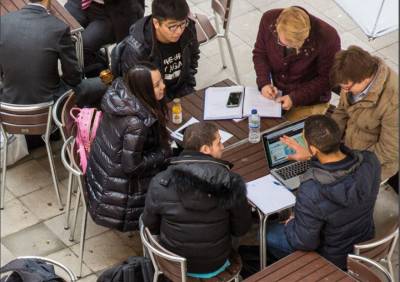UCL 2034 sets out a vision for UCL to become “A global leader in the integration of research and education, underpinning an inspirational student experience” and the Education Strategy seeks to establish UCL as a blended campus in which technology supports authentic, creative and collaborative learning, enables a wide range of assessment approaches, augments face-to-face contact and encourages productive learning outside of the classroom.
Over the last few years we have slipped down the National Student Survey league table, so not only do we have great aspirations in education, we also have catching up to do. An outstanding student experience, in all its breadth, can only be achieved when we harness the power of technology to foster collaboration and deliver our excellent teaching.
Getting the basics right - improving the student digital experience
We will prioritise improving the student digital experience, providing a quality technology-rich blended environment for student study. The student digital experience encompasses the physical infrastructure for student study (WiFi, classroom AV, Lecturecast and student computers), virtual learning environments, and the support provided for students’ skills development.
Our aim is to offer high-quality and standardised AV facilities in all of UCL’s 453 teaching spaces together with ubiquitous Lecturecast. Standardisation is vital to ensure it is easy for our lecturers to use the in-room technology easily and effectively. Differences in standards between centrally managed and departmentally managed spaces can lead to a disjointed experience for staff and students and needs to be addressed.
The scale of UCL and the increasing sophistication of teaching space technology means we’ll need to invest at least £1.8m each year to maintain a good quality teaching space digital experience. In terms of cost per student this equates to about £50 per student.
Historically our provision of student computers has lagged the Russell Group median and it remains well behind the leading institutions in the sector even though we now have 3,534 student computers across the institution. Our aim is to be within the second quartile of Russell Group institutions for student computer provision. WiFi is also among the basics and it’s where we’ve seen some of the highest increases in demand with annual growth in the number of connected devices exceeding 33%. Just to keep up requires on-going increases in capacity to ensure students and staff receive an excellent experience with sufficient capacity. In order to maximise the utilisation of learning spaces and student computer spaces, we will seek to use innovative furniture solutions so that desktop computers can be folded away to provide more flexible study space. The number of laptop loan computers will be increased, especially in Libraries, to enable non-computer equipped learning spaces to be used for computer-based study if needed.
Digital Education - connected learning
Under connected learning we aim to support UCL’s ambitious Connected Curriculum and related initiatives. We’ll establish
a distinctive digital education environment to connect students with each other, with staff, with research and with the outside world to support networked, research-based and interdisciplinary education.

UCL students - photo by Mary Hinkley
Digital Education - online credit bearing, open and life learning
We will develop our capability to support online credit-bearing and open courses to enable UCL to benefit from the opportunities new technology now offers. Credit-bearing courses include wholly online degree courses such as the recently introduced mba@ucl programme which is delivered in partnership with 2U. Open and short courses include open learning resources that are free to use such as MOOCs, and facilities to support Continuing Professional Development and life-long learning. Our aim is to develop a reusable digital framework that will simplify our delivery of online courses, whether credit bearing or not. This will enhance the applicant and student experience but also enable new course and programmes to be added swiftly and cost effectively.
Empower staff to meet students' digital expectations
The Education Strategy commits us to providing improved tools, support and infrastructure for teaching and support staff to help them to develop their own digital scholarship and guide them in designing curricula for blended learning.
| Objective 1: Radically improve the student digital experience | Objective 4: Easy to use enterprise-wide technologies |
| Objective 2: Develop UCL's research IT capabilities | Objective 5: Effective Information Security services |
| Objective 3: Digital transformation | Objective 6: Transformed IT infrastructure |
 Close
Close

